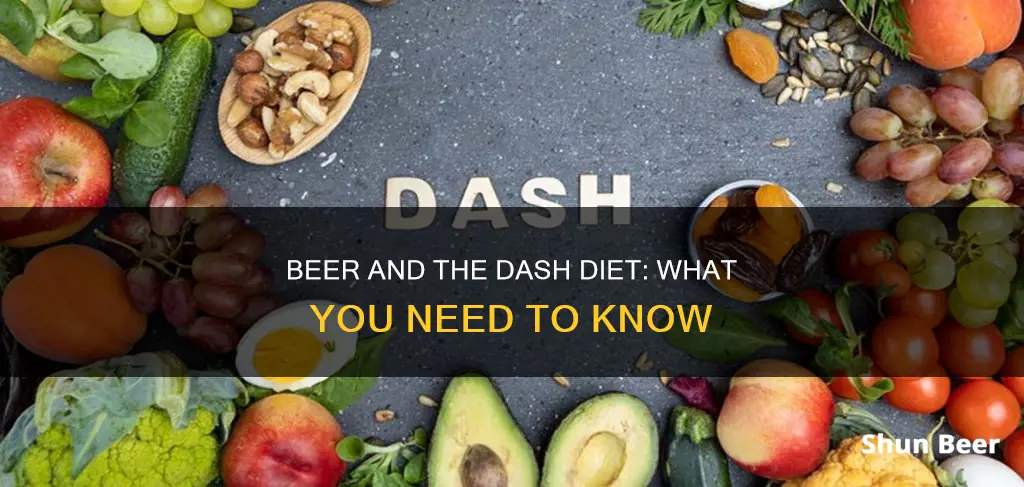
The DASH diet, or Dietary Approaches to Stop Hypertension, is a diet that focuses on reducing blood pressure and the risk of heart disease. The diet emphasises eating fruits, vegetables, whole grains, lean meats, and low-fat or non-fat dairy, while limiting red and processed meat, sweets, soda, and sodium.
The DASH diet does not explicitly prohibit alcohol, but it is recommended that alcohol consumption is limited. Men are advised to consume no more than two drinks per day, while women should consume no more than one.
While the DASH diet does not promote alcohol intake, some studies have found that moderate alcohol consumption (one to two drinks per day) by adherents to the diet was associated with a reduction in fat intake and blood pressure.
| Characteristics | Values |
|---|---|
| Purpose | To prevent or treat high blood pressure and reduce the chance of developing heart disease |
| Focus | Fruits, vegetables, whole grains, lean meats, low-fat or non-fat dairy, nuts, seeds, lentils, beans |
| Alcohol | No specific guidelines, but alcohol intake has been linked to high blood pressure |
| Salt | No more than 3/4 teaspoon or 1,500 milligrams of sodium per day |
What You'll Learn
- The DASH diet is a nutritional intervention for lowering blood pressure
- The DASH diet emphasises a high intake of fruits, vegetables, low-fat or non-fat dairy, nuts, seeds, lentils, beans, and whole grains
- The DASH diet is generally safe, but it may need to be modified to accommodate certain health conditions
- The DASH diet has been shown to have several other benefits, including lowering cholesterol and assisting in weight loss
- The DASH diet is not recommended for individuals with decompensated cirrhosis

The DASH diet is a nutritional intervention for lowering blood pressure
The DASH diet generally emphasises a high intake of fruits, vegetables, low-fat or non-fat dairy, nuts, seeds, lentils, beans, and whole grains. It limits the consumption of red and processed meat, sweets, soda, and sodium (salt). The number of servings you can eat depends on how many calories you consume. For example, for a 2,000-calorie diet per day, the DASH diet advises four to five servings of fruit and vegetables per day, six to eight servings of whole grains per day, and two or three servings of low-fat or fat-free dairy per day.
The DASH diet is intended to be flexible and well-balanced. It does not emphasise special foods to eat. Instead, the diet focuses on eating a specific number of servings from various food groups. The diet is rich in nutrient-dense foods that are high in lean protein and fibre, and low in sodium and saturated fat. It is also full of foods that are rich in minerals such as potassium and magnesium, which are known to lower blood pressure levels.
The DASH diet has been scientifically proven to noticeably lower blood pressure and cholesterol, reduce the risk of diabetes, and lower the chances of heart disease and strokes. It has also been linked to a lower chance of developing metabolic syndrome, and research demonstrates that it may improve insulin resistance.
Do LCBO Gift Cards Work at Beer Store?
You may want to see also

The DASH diet emphasises a high intake of fruits, vegetables, low-fat or non-fat dairy, nuts, seeds, lentils, beans, and whole grains
The DASH diet, or Dietary Approaches to Stop Hypertension, is a diet that focuses on reducing blood pressure and the risk of heart disease. It is recommended for people who want to prevent or treat high blood pressure. The diet emphasises a high intake of fruits, vegetables, low-fat or non-fat dairy, nuts, seeds, legumes, beans, and whole grains.
The DASH diet recommends eating 4-5 servings of fruits and vegetables per day. This includes fruits like apples, pears, peaches, berries, and tropical fruits like pineapple and mango. For vegetables, all types are allowed, including leafy greens like spinach and kale, and other vegetables like broccoli, carrots, squash, and tomatoes.
The diet also recommends 2-3 servings of low-fat or non-fat dairy per day. This includes skim milk, low-fat cheese, and yogurt.
For nuts, seeds, and legumes, the DASH diet recommends 4-5 servings per week. This includes almonds, peanuts, hazelnuts, walnuts, sunflower seeds, flaxseeds, kidney beans, lentils, and split peas.
The DASH diet suggests eating 6-8 servings of whole grains per day. Examples include whole-wheat or whole-grain bread, whole-grain cereals, brown rice, bulgur, quinoa, and oatmeal.
Drinking Beer in Autzen Stadium: What's Allowed?
You may want to see also

The DASH diet is generally safe, but it may need to be modified to accommodate certain health conditions
The DASH diet is generally considered safe, but it may need to be modified to accommodate certain health conditions. For example, individuals with decompensated cirrhosis (sudden loss of liver function) should not follow the DASH diet. Additionally, those with peanut allergies should avoid peanuts and replace them with seeds. For those with celiac disease, gluten-free foods such as brown rice, corn, and tapioca are recommended, while gluten-containing grains like wheat, barley, and rye should be avoided.
The DASH diet may also need adjustments for individuals with lactose intolerance, who can choose lactose-free products or take a lactase pill when consuming lactose-containing foods. For those with type 2 diabetes, working with a dietitian to plan a low-carbohydrate version of the DASH diet that includes foods with a low glycemic index is advised. Furthermore, the DASH diet contains many high-fiber foods, which can cause bloating. To mitigate this, it is recommended to slowly incorporate high-fiber foods like fruits, vegetables, and whole grains into the diet over several weeks.
While the DASH diet is generally safe, it is always advisable to consult with a healthcare provider or registered dietitian before starting any new diet, especially if you have specific health concerns or conditions. They can provide guidance and modifications tailored to your individual needs.
Beer and Nexium: Safe Mix or Health Risk?
You may want to see also

The DASH diet has been shown to have several other benefits, including lowering cholesterol and assisting in weight loss
The DASH diet has been shown to have several benefits, including lowering cholesterol and assisting in weight loss.
The DASH diet, or Dietary Approaches to Stop Hypertension, is a diet that focuses on lowering blood pressure. It is recommended for people who want to prevent or treat high blood pressure and reduce their chances of developing heart disease. The diet is low in red meat, salt, added sugars, and fat. It emphasises eating fruits, vegetables, whole grains, and lean meats.
The DASH diet has been shown to have several health benefits beyond reducing blood pressure. Firstly, the diet has been linked to a lower risk of diabetes. Research also demonstrates that it may improve insulin resistance. Secondly, the DASH diet may be linked to a lower chance of developing heart disease. Research suggests that the diet may help lower various risk factors for heart disease, such as blood cholesterol, sugar, and fats. Thirdly, the DASH diet has been shown to reduce the risk of metabolic syndrome by nearly 50%.
The DASH diet has also been shown to assist in weight loss. A 2020 study found that following the DASH diet containing at least 126 grams of lean protein helped older adults over 65 with obesity reduce body fat. Another study suggests that the DASH diet can be helpful in lowering belly fat. The DASH diet is generally well-tolerated and may not feel as restrictive as other popular eating plans. However, it may require more planning when food shopping, creating meals, and cooking.
The DASH diet is a safe and effective strategy for lowering blood pressure and improving cardiovascular health. It has also been shown to have several other benefits, including lowering cholesterol and assisting in weight loss.
LSU Stadium Beer Rules: What Fans Need to Know
You may want to see also

The DASH diet is not recommended for individuals with decompensated cirrhosis
It is important to consult with a healthcare provider or a registered dietitian before starting any new diet, especially if you have a medical condition such as decompensated cirrhosis. They can provide guidance and recommendations based on your individual needs and health status.
Beer After a Colonoscopy: What You Need to Know
You may want to see also
Frequently asked questions
Unlike other diets, the DASH diet does allow for alcohol. However, it should be consumed in strict moderation. Excessive drinking has been linked to hypertension. The DASH guidelines state that men should drink no more than two servings of alcohol a day, and women should consume no more than one drink daily.
DASH stands for "Dietary Approaches to Stop Hypertension". It is a diet that focuses on eating a specific number of servings from different food groups. It is rich in fruits, vegetables, whole grains, low-fat or non-fat dairy, beans, nuts, seeds, and lean proteins like fish or chicken. It limits the intake of red and processed meat, soda, sweets, and salt.
The DASH diet is scientifically proven to lower blood pressure and cholesterol, reduce the risk of diabetes, and lower the risk of heart disease and strokes. It has also been shown to aid weight loss.
The DASH diet recommends eating whole grains, fruits, vegetables, lean protein sources like chicken, fish, and beans, and cooking with vegetable oils. It also suggests choosing fat-free or low-fat dairy products.







